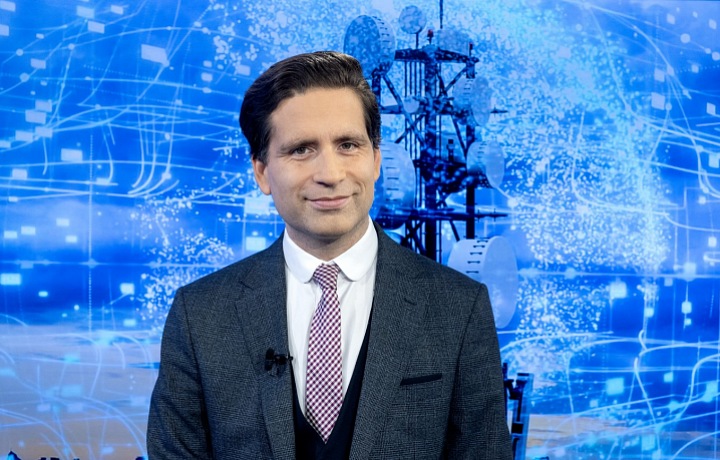The crown protected us from inflation. The Czech economy may be hit the most by Trump's tariffs, says economist Lukáš Kovanda
Lukáš Kovanda is an economist who is well known to everyone mainly from television screens. He used to be a member of the National Economic Council of the Government and currently works as the chief economist of a bank. His views often differ from those of his colleagues, however it must be said that he always has his estimates calculated in detail. In the interview, we talked to him about the topics that currently resonate the most with Czech society.
How did you come to your profession?
Actually, I don't even remember what was the primary impulse. It was more of an effort to somehow understand the world around me and economics combined the perspective of, let's say, the humanities and also there was an exact aspect. Economists must master a whole range of calculations, but today's mathematical models are practically indistinguishable from the economic ones or those models of exact sciences. I liked that there was a combination of these worlds. Humanities, or social sciences, intertwine in economics, and because I didn't feel like being distinctly humanities-oriented or distinctly exact, economics were the most suitable combination for me. The golden middle way.
I wondered if you use artificial intelligence in your work?
Not too much yet, but it's definitely only a matter of time before that happens. I still have the problem that I often work with the most current data, which may not be available. Artificial intelligence is often not so well resourced, though that is probably not the case with all those apps and platforms, but it could be. It gives me some uncertainty as the processor of that information. So then I lose time by verifying whether the artificial intelligence takes that data from relevant sources. For me, in this regard, it's not such a saving yet.
You have a doctorate. How do you remember your years of studying and university?
I studied at the Faculty of Social Sciences of Charles University at the Institute of Economic Studies there. There I completed a master's degree and then I did a doctorate at the University of Economics, which was also an interesting experience for me. I was able to compare these two schools. It is said that the Faculty of Social Sciences is more focused on theoretical economics and the other is more for managers or entrepreneurs. I had the opportunity to perceive it and I would not paint such a sharp reservation exactly like this. I know people who have been successful at the Faculty of Social Sciences and they are not theoretical economists, but managers, and on the contrary, there are people who have a diploma from the University of Economics and are more involved, whether at the Ministry of Finance or at the Czech National Bank, in more academic and theoretical economics rather than the practical application of economic knowledge.
What was your biggest economic mistake? Something where you significantly changed your perspective over time.
People continuously adapt their perception and views to changing circumstances. In my opinion, however, it is necessary to maintain some basic consistent plot line. What I was wrong about was certainly covid. I assumed there would be much deeper economic downturns and I felt it would be comparable to the global financial crisis in 2009. Maybe there would have been a drop in property prices or problems in the car sales area, because we know that in 2009 the Czech government even considered scrapping, in Germany, scrapping was actually introduced, which means certain bonuses from the state for letting your old car scrapped and buying a new one. It was supposed to support the car market at a time when there is a slump due to some crises and there is no demand, people are afraid to spend, they do not have money, they are fired from work and so on. I expected this to happen in covid times. That did not happen and the reason is simple. The governments, and not just the Czech one, were much more willing to spend big money and get heavily indebted to keep the economy afloat, even though it was essentially closed. The difference between the global financial crisis and the Covid crisis was that in 2009 a major counterparty risk arose. Banks did not trust each other, they were not willing to lend even among themselves under favorable conditions, which inflated interest rates or those risk premiums of interest rates, to be more precise. Therefore, central banks then of course lowered their interest rates to mitigate the impact of the higher interest risk surcharge. It was a counterparty crisis or a crisis related to counterparty risk. It was a crisis that arose within the economic system. The Covid crisis, on the other hand, was not a symptom of any economic system failure or bank mistrust and rise of those credit risk surcharges, but it was simply a crisis that was not of economic origin, but of health origin or some exogenous shock, as economists say, which hit the economy from the outside. Whereas the previous crisis was created within the economic system. However, one could then expect a similar outcome, but another big difference of those two crises was that governments were much more willing to pour rescue money into the economy, and not only the Czech one. So, this perhaps surprised me the most, that it was not confirmed that you can simply take some crisis from recent history and apply it to what is happening now, because the state's attitude has changed over this relatively short period. I must say, I really did not expect such an approach.
The Governor of the Czech National Bank, Mr. Aleš Michl, has declared that this year will be a year of financial stability and low inflation. Do you agree with him?
Low inflation will probably occur. Even though we can never hear anything else from the Czech National Bank. It always has to somehow send calming signals. It has a great influence on the thinking of society. Inflation is of course also a psychological phenomenon, as people expect prices to rise, the cost of living to increase, so certain self-fulfilling prophecies can manifest in the sense that they may be more agressive in wage bargaining. If they fear this price increase, they will already be preparing the ground and will push more for wage growth and the growth in wages itself will cause the inflation that people would not feel, if they were not scared of inflation in the first place. So it is important to send credible signals, which is exactly what the CNB does when it says that inflation will be low, thus sending a signal "people look, there's no point stressing now, going to your employer, unions shouldn't dramatically threaten strikes for higher wages, because we simply don't expect inflation to be derailed, it will simply be within the tolerance band, so you don't need to worry." Inflation expectations are of course also tied to the expectations of companies, their planning and budgeting. If they expect higher prices, they can in turn limit investments, which unnecessarily stifles the economy. Banks may be hesitant to go lower with interest rates, which also stifles the economy. This is reflected in the bond market, as bond traders perceive what the CNB says, it is a relevant source for them. All this leads to the economy potentially performing worse than if inflation expectations were more anchored. So psychology plays an important role, expectations play an important role and from the CNB we can't hear much else than that it will be good and better, that it will simply remain stable. However, it must be said that other institutions do not currently have in their forecasts that inflation would significantly shoot somewhere. Our bank expects that, on average for the whole year, the rate of year-on-year inflation will be 2.3%, which means 0.1 percentage point smaller inflation than this year.
The topic of adopting the euro resonates long-term in the Czech Republic. What would it mean if the Czech Republic adopted the euro? Is it feasible in the foreseeable future?
It depends on politics. The composition of the parliament in the next term, that is the results of this year's elections. Who will govern the Czech Republic? If it's the parties of the current penta coalition, it's quite likely that there will be some steps towards adopting the euro. On the contrary, if the current opposition will govern more, I wouldn't expect any further steps towards adopting the euro in the next term. This means that there is no longer any chance basically that we would start steps towards adopting the euro by 2030. On the contrary, if a coalition similar to the current one is in power, which public opinion polls so far are suggesting otherwise, but there is still a long way to the elections and many things can happen, then in such a case the probability that the Czech Republic could have the euro before 2030. It would mean that the Czech Republic would lose its independent monetary policy. Which means that interest rates would no longer be set by the Czech National Bank, but would be determined by the Central Bank in Frankfurt. This of course also has its major disadvantages, along with some benefits, such as the size of the euro as a currency providing greater certainty.
How would this affect the average Czech citizen?
If we focus on the recent energy-inflation crisis, which escalated in connection with the fall of Russian troops in Ukraine, it should be said that the Czech Republic would have higher inflation. This may be surprising, because some say that we had this inflation because we still have the crown and do not yet have the euro. The opposite is true. It's in fact the crown that protected us from even higher inflation. I know that talking about how it protected us from inflation, when inflation rose to 18% in the middle of 2022 might be amusing, but we have to say that without the crown it could have been perhaps 25%, like in Estonia, which pays with euro. Simply, we would not have our independent monetary policy and Frankfurt, from where this policy would be directed, started raising interest rates only a year later than the CNB (Czech National Bank) and raised them at most to 4%, while the CNB to 7%. This means that thanks to our own monetary policy we could fight against inflation more aggressively than Frankfurt would have, if we already surrendered to them our monetary policy through the sharing of the euro.
You've slightly touched my next question, which regards political forecasts. What would Andrej Babiš's government mean? What could it bring from the economic point of view?
At this moment it is hard to say, because we haven't even seen an election program yet. But if we had, the next question is who Andrej Babiš would govern with. Or if he would govern at all, which is not certain because remember the last election when he was also the winner, but did not have a coalition potential, so he actually isn't in power. Whether he would govern with ODS, whether he would govern with the Motoring party, or whether he would govern with SPD, this would of course determine the program. I would expect him to try to reform the pension reform again and change it in some way, because ANO movement has poured a lot of political capital into it. He would probably reinstate EET in some time, which the ANO movement has been criticizing for a long term. I wouldn't expect him to reduce public debt, which he also admits is not a priority and not necessary. I would also expect that no significant taxes would increase substantially. Maybe the property tax for foreigners from countries outside the EU will increase. Now I have noticed that he wants to copy the Spanish idea with a 100% tax for property investors from countries outside the EU, which would probably cool down the demand for properties in the Czech Republic and would rather mitigate the growth of property prices. It would create a certain pressure for a slower increase in property prices in the Czech Republic, from which Czech households could benefit, but it certainly would not lead to significantly more affordable housing. For this purpose, other steps need to be taken, such as better construction legislation, better spatial planning, etc.
Regarding the pension reform, do you think the current government is dealing with it adequately? Should there be a change in the Czech mentality? Shouldn't we instead teach citizens to simply take care of themselves financially instead of relying on the state?
Yes, they should take care of themselves, and that is, I think, the role of politicians, to instill this in the public. To say save from the age of 20, 25. I know it may seem too early, but it is not. It makes sense and it makes sense to invest from this age, maybe 500 crowns a month. Politicians should clearly, because they have a great opportunity to speak to the public through the media and other platforms, use their influence in this sense, that they will warn the public that if they do not want to live on water and dry bread in old age, then they should be doing something for their old-age security from a relatively young age and that it has significant advantages. Even if pensions were somehow secured, investing at a young age is still a good thing that can significantly increase your wealth at the age when you are no longer productive, you have to retire, because you simply no longer have the physical strength, you want to enjoy your old age i.e. at the age of 60, 65+, so at this age, whoever thinks about investing about 40, 35, 30 years earlier, will actually be reaping sweet fruits. It seems that too few Czechs realize this, and you don't have to invest any huge funds. 500 crowns a month to start investing regularly and actually in 40 years you will have a huge lead over someone who only starts thinking about this at 40 and he practically has no chance of catching up with you if you started at 20, 25.
This also relates to the Supplementary Investment Product, aka SIP. I get the feeling that the expectations of financial institutions were somewhat greater than what I've recorded. How do you perceive it? Was there enough information from the government and so on?
Apparently not. The SIP kind of surprisingly appeared. We have done a specific television program on this topic, but it evidently did not resonate as much with the Czech public as the government might have wished. I think it's a good product, it's a step in the right direction. Basically, the Long-term investment product is a kind of tax advantage both from the side of the actual investor, employee, and from the side of his employer. Advantages are investing which means, it somehow paves the way for the Czechs to think relatively soon after they start their professional career about putting aside and investing part of their earned money. Unfortunately, the interest is not as great as it would ideally be. So hopefully, it's some kind of birth pain, a teething problem. Once the SIP becomes more familiar, it will be more successful, there will be more interest. The role of politicians is again to explain to the public the advantages of the SIP and that it is for their own good, so that they can have old age that will resemble the old age and pension of those unreachable ideals like Swiss or German pensioners, which are often mentioned in this context.
What, from your perspective, does the election of Donald Trump as the American president mean for world politics?
Great uncertainties. On the other hand, for Europe, this could be a significant wake-up call. So I definitely do not perceive it purely negatively, even though the Czech economy may be among those that will be most affected by those tariffs. Because according to a study by the Danish Confederation of Industry, there is a risk in the Czech Republic that about 55,000 people will lose their jobs due to Trump's tariffs. In addition, the Czech Republic could also lose up to 300 billion crowns in 2027 when the maximum increase happens, if the tariffs start to be introduced this year, the increase could be such that the Czech economy could lose around 300 billion crowns in a year due to these tariffs. That's not a negligible sum and we need to take it into account, although I think that Donald Trump will eventually not introduce these tariffs in full force as he promised in his pre-election campaign, that he will rather try to put some pressure on the EU, on China and on the Czech Republic to work in his favor. We already see this now, when he wants to buy Greenland, he threatens Denmark, under which Greenland falls, that if they do not sell Greenland to him, he will impose very high tariffs on Danish imports to the United States. So he will try to achieve his goals with these tariffs, and if the given country meets these goals, if it accommodates Trump's demands, then I think he does not need to impose these tariffs. In the Czech context, it could mean that he will really demand that we spend more on our defense, I don’t know if it’s the 5% he mentions, but definitely more than the 2%.
Thank you very much for the interview.
Source: author's text, own questioning











